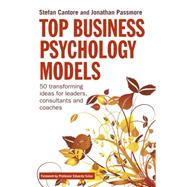
Note: Supplemental materials are not guaranteed with Rental or Used book purchases.
Purchase Benefits
What is included with this book?
| Acknowledgements | p. viii |
| About the authors | p. ix |
| Foreword | p. x |
| Introduction | p. 1 |
| The individual at work | p. 5 |
| What makes people do things?: Maslow's hierarchy of needs | p. 9 |
| How can we become more engaged with work?: Flow | p. 13 |
| How can people develop their self-awareness?: Mindfulness | p. 16 |
| Helping others to set goals: The Grow model | p. 20 |
| How can people learn to become more optimistic?: Learned optimism | p. 24 |
| Why did they do that?: Attribution theory | p. 28 |
| How can we make sense of who we are?: Personality trait and type theory | p. 32 |
| How does psychological testing work?: Psychometrics | p. 35 |
| How do we think about others thinking?: Theory of mind and emotional intelligence | p. 39 |
| How can we manage our negative thinking?" Cognitive behavioural model | p. 43 |
| How can job performance be accurately and fairly assessed?: Behaviourally anchored rating scales (BARS) | p. 47 |
| How do people cope with change?" Phases of change models | p. 50 |
| How do we understand different types of people?: Myers-Briggs Type Indicator (MBTI) | p. 55 |
| How do we know if someone is telling us a lie?: Facial displays | p. 59 |
| How can people understand and build on their strengths?: Values in Action Inventory of Strengths (VIA-IS) | p. 62 |
| What can employers do to improve the mood and commitment of their staff?: Psychological capital | p. 66 |
| How to help people cope well with change: Three phases of transition | p. 70 |
| Where does motivation come from?: Self-determination theory | p. 74 |
| How can we rely on psychometric tests?: Reliability and validity | p. 78 |
| How can people change their behaviours?: Transtheoretical Model of Change | p. 82 |
| How do people positively handle trauma?: Post-traumatic growth theory | p. 87 |
| How can people develop their capacity to cope with adversity?: Resillience | p. 91 |
| Team effort | p. 95 |
| Do people work harder if you give them more attention?: The Hawthorne effect | p. 99 |
| Do the assumptions that managers have about people affect how they do their work?: Theory X and Theory Y | p. 103 |
| Do groups always make the best decisions?: Groupthink | p. 106 |
| What behaviours improve team performance?: Belbin team roles | p. 109 |
| Does an attractive communicator influence our decision making?: Attractiveness theory | p. 113 |
| How to use goal setting to enhance performance: Goal-setting theory | p. 117 |
| Why do people obey authority figures even when they are being asked to do something they know is wrong?: Obedience to authority theory | p. 121 |
| How can you select the best candidate at an interview?: Behavioural interviewing | p. 125 |
| How do people make up our minds?: Majority and minority influence | p. 129 |
| How can we positively help people and teams change?: The Skilled Helper Model | p. 133 |
| How does shift work impact on how well people do their work?: Circadian rhythms and performance at work | p. 137 |
| How do groups develop to become effective?: Tuckman's group development | p. 141 |
| How can you ensure everyone makes a fair contribution to team goals?: Social loafing theory | p. 145 |
| How do you get good outcomes for both sides in a negotiation?: Best alternative to a negotiated agreement (BATNA) | p. 149 |
| How do I make decisions in a complex world?: Cynefin complexity model | p. 153 |
| How can we specify the behaviours required to perform a task well?: Critical incident technique | p. 157 |
| Organizations | p. 161 |
| How useful are positive emotions?: Broaden-and-build theory of positive emotions | p. 165 |
| What can organizations do to transform the way they think and act?: Appreactive inquiry | p. 169 |
| How do people's expectations of their employers affect the way they work?: Psychological contract | p. 173 |
| What can you do to make training a good investment?: Social learning theory | p. 177 |
| How do I take account of the forces for and against change?: Force field analysis | p. 181 |
| How can you make a workplace fair?: Organizational justice | p. 185 |
| How do you tackle difficult people at work?: Managing difficult people | p. 189 |
| How do people really make decisions?: The bounded rationality model of decision making | p. 193 |
| How can good conversations change organizations?: Conversational approaches to change | p. 197 |
| How can metaphors help managers change their organizations?: Organizational metaphors | p. 202 |
| How can you make work less stressful?: The vitamin model of stress | p. 206 |
| What can we do to make our writing more readable?: FOG Index of Readability | p. 210 |
| Table of Contents provided by Ingram. All Rights Reserved. |
The New copy of this book will include any supplemental materials advertised. Please check the title of the book to determine if it should include any access cards, study guides, lab manuals, CDs, etc.
The Used, Rental and eBook copies of this book are not guaranteed to include any supplemental materials. Typically, only the book itself is included. This is true even if the title states it includes any access cards, study guides, lab manuals, CDs, etc.